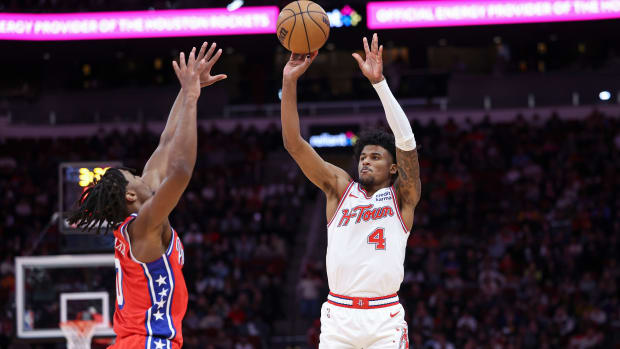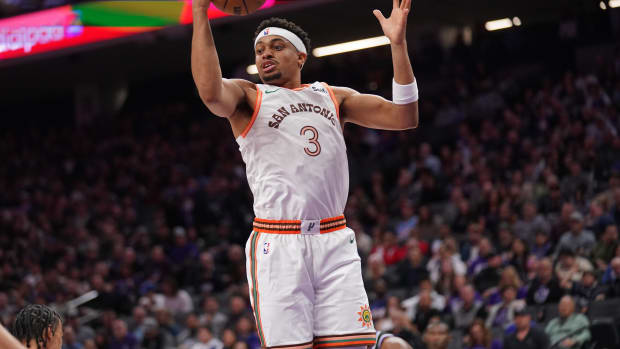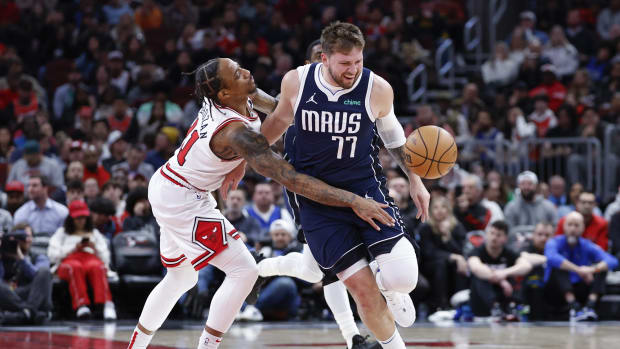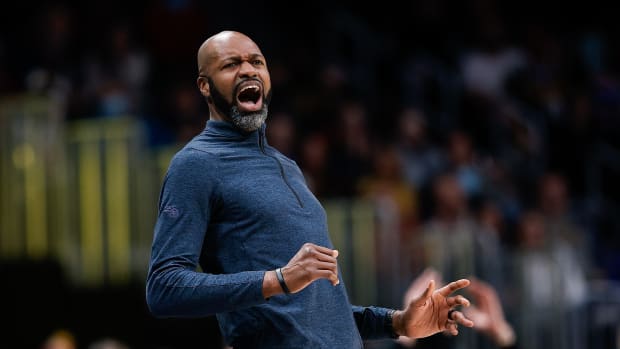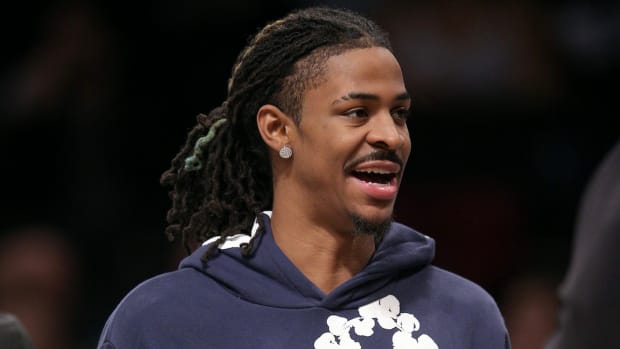
David Blatt: Family man, former Xerox salesman and believer in '72 Olympics
“It’s nice to know,” says David Blatt, sticking in the needle, “that jingoism isn’t dead.”
It’s a couple weeks ago, and we are sitting in the high-rise Atlanta condo of Blatt’s childhood, and best, friend, Gary Bernson. The subject is the controversial 1972 Olympic basketball gold medal game between the United States and the Soviet Union, which the latter won, 51-50 after there transpired possibly the most controversial three seconds in sports history.
“It’s not jingoism,” I protest. “I just believe the Americans got screwed.”
This is a subject that Blatt has famously visited before, when he was coach of the Russian national team. Blatt drew the ire of (among others) Mike Krzyzewski by saying that he believes the Soviet victory was legit (Coach K’s response at the time: “He’s a Russian.”). After Blatt got the Cleveland Cavaliers head coaching job, I figured that he might temper his opinion for an American audience.
Meet new Cleveland Cavaliers coach David Blatt: The King of Roam
But, no, he doubled down on his view that the Soviets deserved to win.
“If you’re looking at it from a by-the-book perspective, you could say the Americans got jobbed,” Blatt says. “But if you’re looking at it from the standpoint of fairness and sport ethic, there is no way you can contend that the outcome wasn’t fair. Look, I’ll reconstruct it for you …”
There isn’t enough time here to run through Blatt’s reenactment, though I’ll return to the subject at the end of the column.
The ’72 final is one of several subjects for which I couldn’t find room in the long profile of Blatt that runs in this week’s Sports Illustrated.
Here are some of them:
• The dynamic of the six-member Blatt family is fascinating. Sometimes the family traveled with him on his coaching adventures, sometimes it stayed behind in Israel, sometimes it came with him part of the time. It was amusing last week to hear his three daughters -- 22-year-old twins Adi and Shani and 16-year-old Ela’ -- argue good-naturedly about how long they had been in Greece, one of his stops. I’m not sure they ever got it straight.
Anyway, when Blatt first told me that his family would be staying back in Tel Aviv while he moved to Cleveland, it surprised me, and, despite his insistence that they were a tight-knit group, I had my doubts. Until I saw first-hand how much love and respect there is among them. They’ve just grown up differently, with the understanding that Dad isn’t always around.
All three of the daughters are athletes but they insist that Tamir, their 17-year-old brother who is a point guard on the Israeli junior national team, is the special one. “One day you will be writing about him,” said Adi.
Consider this: You are a teenager in love with hoops and your dad gets a gig to coach LeBron James. Don’t you drop everything and come to America? You can still play hoops over here while also hanging out with the Cavs.
But, no, that was never in Tamir’s plan. His life is in Israel, with his high school team and the junior national team.
“My son, like his dad, is an independent kid who wants to make his own path,” says Blatt, “and his path, right now, is in Israel.
“You have to understand that, for Tamir, his dad was coaching the number one team in Israel and the number one team in Europe,” says Blatt, referring to Maccabi Tel Aviv. “So it’s not like he was completely blown away when I got the job. He was excited and, of course, he understands how good LeBron is. But he didn’t run right out, put on a Cavs hat, and whip out his cell phone.
“When Tamir was 6 years old I could already see that he had an understanding of the game. He would always pass ahead. If Pete Carril [Blatt’s coach at Princeton] saw him, I know exactly what he would say: ‘The boy can see.’ In Pete’s way of looking at the game, that was the highest compliment you could give.”
Irony note: While Tamir’s NBA heroes are mostly point guards -- Kyrie Irving and Chris Paul among them, plus John Stockton and Steve Nash, the old-schoolers his dad gave him videos of -- Tamir’s favorite NBA jersey was one from Miami. Wade 3.
YouTube clips of Tamir are readily available, but the best Blatt kid vid might be this one of the twins, while on holiday in Mexico, celebrating Maccabi’s 2014 championship.
[youtube=http://youtu.be/NE2NdLvh2xY]
• Blatt says that he feels “responsibility” for being the first European coach to go directly to a head NBA job.
“I’ve been given an opportunity that many others haven’t, and it’s my job to give a good impression,” he says. “That way, maybe a lot of guys who were in my situation get a chance to come over. There’s a lot of great coaches in the United States, but there are a lot of great coaches overseas, too. The influx of international players has added greatly to the appeal of the NBA, and I hope international coaches can do the same thing in some way, shape or form.”
• Blatt says that when he was first contacted by Cavaliers general manager David Griffin, he had “no idea” he was being interviewed for the job. “I thought it was just a friendly conversation since I had known Griff for a long time,” says Blatt. “We were just having just a discussion about players and teams, and it sort of evolved into an interview. That’s what led to my coming to Cleveland for the official interview. If that hadn’t gone well, I don’t think I would’ve been invited to the formal interview in Cleveland.”
Griffin doesn’t concur with that, by the way; he maintains that Blatt was a big dot on the Cavs’ radar from the beginning.
• It’s often been written that Carril, for whom Blatt played at Princeton, had a huge impact on Blatt’s basketball philosophy. That’s true to a degree. But Blatt says that he took more “overall basketball” from his Framingham South coach, Philip “Smokey” Moresi. But he got this from Carril:
“Pete taught me that players should be multi-faceted, familiar with all aspects of the game. He liked big guys who could shoot and guard who could post up and rebound. Pete always said: ‘Don’t teach a team plays; teach them how to play.’ I never forgot that.”
• He also got, as all of Carril’s players did, a lifetime of stories. This is one of his favorites:
“Pete had the idea that Tommy Young (nicknamed “Too Tall,” Young was a 6-foot-11 center) didn’t play hard enough,” remembers Blatt. “So in the middle of practice one day, Pete takes the cigar out of his mouth, taps the ashes into Tom’s palm, closes it and says, ‘Maybe that will light a fire under your ass.’
“I never did that. I don’t think many coaches smoked a cigar during practice, even in the old days.”
• Blatt credits Moresi for straightening him out early. He recalls this:
“Smokey saw me for the first time in eighth grade. He was watching me in a pickup game with older kids and I managed to stay on the court for over an hour. Afterward, he comes up to me and says, ‘Hey, you’re a pretty good player.’
“And I say, real disrespectful, ‘Yeah, okay.’
“I wasn’t a bad kid. Just kind of aggressive and a know-it-all, like a lot of kids, cocky, overconfident.
“So he says, ‘Do you know who I am? I’m Coach Moresi from the high school team.’
“Suddenly everything changed in my tone and demeanor. It was all yes-sir-no-sir. And he says to me, ‘Okay, I got one thing to tell you -- cut your hair.’
“It sounds small, but it was a defining moment in my life. He was telling me that if you want to be part of something larger than yourself, you ascribe to the principles and rules of our team. And I did.”
• For two years in the mid-1980s Blatt lived in Atlanta and worked for Xerox. During that time most of his spare hours were spent playing on the Atlanta playground, and he had a formidable team that included Bernson, a teammate at Framingham South High School. His proudest moment came in the Atlanta Pro-Am League. “We beat a team that had Dominique and Gerald Wilkins, Doc Rivers and Kevin Willis,” says Blatt. ‘Nique, Rivers and Willis were all starters on terrific Atlanta Hawks teams during that time, and I wondered if Blatt ever reminded Clippers coach Rivers about the game.
“I met him face-to-face only a couple of weeks ago,” said Blatt, “and I didn’t want that to be the first thing I said to him. I have far too much respect for Doc.”
• What will be Blatt’s biggest challenge? Different folks see it different ways.
In the opinion of Steve Mills, the Knicks general manager and a Princeton teammate of Blatt’s:
“NBA guys have come up differently than most of David’s players in Europe, who are taught the fundaments in a club system. His challenge will be to connect his guys now, who have come up in more individualistic systems, to team concepts.”
In the opinion of Blatt’s best friend, Bernson, who does know the game:
“David’s teams have always gotten better as the year went on. But with LeBron on your team, I think his biggest challenge will be dealing with the pressure if they do get off to a rough start.”
In the opinion of Cavaliers general manager Griffin:
“I think it will be learning how to manage a staff as large as we have. In Europe he essentially had one assistant. He was also the day-to-day general manager. Now he’s got a staff of seven or eight, a bunch of assistant coaches, advance scouts, video people, a large training staff and 15 players. The enormity of it all can weigh you down. I know because I felt weighed down in the beginning.
“See, David is a guy who builds deep personal relationships with the people he works with. So it will be a challenge to do that with that number of people. He’ll find it hard to be that ON with THAT many people all the time.”
The opinions of Mills and Griffin jibe with Blatt’s own take on his biggest challenge. Though he didn’t want to be too specific -- he hasn’t even been on the court with his guys yet -- he knows that he will have to compromise on his share-the-ball, keep-the-court-open style in favor of occasional isolations. And as Griffin says, he acknowledges that deep personal relationships have always defined his coaching. He just doesn’t see it as a potential problem.
“I’ve never had a problem relating to players,” says Blatt. “Ever. Yes, this will be different. But what can be more different than going into Russia cold and coaching in that environment? Or going in cold to Italy or Turkey or Greece? So one thing I won’t have a problem with is communication with players.”
• So, finally, back to 1972 …
Blatt knew about the game -- he was 13 when it happened -- but got his interest renewed when, during his tenure as coach of the Russian national team, a documentary about it was brought to his attention by none other than Soviet player Ivan Edeshko, the guy who threw the pass to Alexandr Belov that eventually won the game. Blatt’s point is that, though the game was unevenly refereed, the Soviets were entitled, by the rules, to the double-do-over that led to the victory. They had legally asked for a timeout that was not granted (at first) and, on a throw-in, the buzzer sounded almost as soon as the ball left a Soviet player’s hand rather than when his teammate caught it, even though there were three seconds on the clock.
Blatt acknowledges that the way the do-overs were handled was illegal. R. William Jones, the imperious head of FIBA back then, came out of the stands and ordered the two replays. “But does that mean that the Russians weren’t correct?” says Blatt. “No it doesn’t. They should’ve gotten a timeout. And the clock was started too early.”
(We agree to disagree. I still go with jobbed.)
At any rate, Blatt wants to make it clear that he and Coach K are on firm ground. “Mike and I kissed and made up,” he says. “It was just two guys expressing their opinion.”































